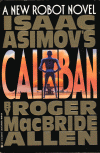Published 39 years ago in 1979, Isaac Asimov discussed the possibilities of finding intelligent life in his book Extraterrestrial Civilizations. This has been on my reading list for quite a long time, but I just now got the notion to mark it off. Having read literally all of Asimov’s fiction, I thought it was time to read more of his non-fiction. Unwittingly, I finished this just a week or two before his birthday, which by the way was 99 years ago today!
I was thinking Extraterrestrial Civilizations would be a discussion on what civilizations might be like when if/when we discover them, or they discover us. It turned out to be more of a thought experiment, methodically laying out probabilities based on list of assumptions. Most of these assumptions were made with what scientific knowledge there was available at the time. Asimov was very careful to speckle the book with asterisks noting that if certain assumptions would change in the future, the predictions would be changed or invalidated.
While going over these assumptions, Asimov explains quite a bit of astrophysics in rather easy to understand language. I recall from his style from his autobiography, I, Asimov: A Memoir, and also Isaac Asimov’s Guide to Earth and Space (not reviewed here). It is a very conversational style and it feels to me like he’s just sitting across the room talking to me. He also throws in a few quips here and there that are quite amusing. When discussing coasting between the stars taking 1,000 subjective years, assuming astronauts are immortal, he writes:
Then, too, the astronauts would have to have something to occupy their minds. Comparatively close quarters with no chance for a change in company for nearly 1,000 years could be very difficult to tolerate. It might not be too cynical to suppose that murder and suicide would empty the ship long before the trip is over, for it is much easier to imagine a victory over death than a victory over boredom.
After finally working his way down to “Figure 13 — The number of planets in our Galaxy on which a technological civilization is now in being = 530,000”, Asimov tackles some of the concerns that some opponents of the search for extraterrestrial intelligence (SETI) have for trying to communicate with other worlds. He argues that the cat’s already out of the bag. We have radio signals going out at the speed of light that have already announced our existence to anyone that is capable and cares to listen. If we do make contact, and the speed of light holds, we should have plenty of time to either escape our solar system and prepare for the worst. Nothing as of yet has shown that the speed of light can be broken, and with acceleration and deceleration needs, it can take quite some time for whatever intelligent species detects our emissions locates us and finds their way here.
He describes a path that humans can take to evolve into star faring people that are not tied to a planet. This massive ships he calls “free worlds” in that they are self sustaining and might grab resources such as comets as they pass through other solar systems, or even gather particles in interstellar space. I felt some sense of hope that humanity might actually survive the destruction of Earth, which seems inevitable without worrying about crazed aliens coming to destroy us, or the Sun turning into a red giant.
Asimov also discusses the conditions required for intelligent life, and what it might look like. He’s careful to qualify his statements with “life as we know it” throughout to cover himself. Basically life as we know it requires a few unique factors, and he goes through those requirements to narrow down possibilities of those factors being met by certain types of stars in our Galaxy.
Overall, this was a very enjoyable read. I’d highly recommend it to anyone interested in the possibilities of life outside of our solar system, despite that the book is a bit dated. If you’ve only read Asimov’s fiction, I think this would be a good introduction to his non-fiction, aside from his autobiographies. If I had the time, I might search out an old copy of one of his science textbooks (yes, he wrote several!) on a subject I don’t know much about and go through it. I’m sure it would be enlightening.


